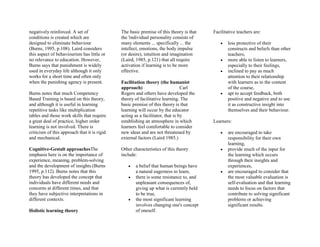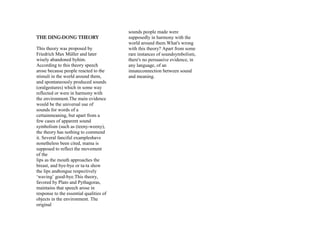This document discusses several theories of learning:
- Learning involves acquiring or modifying knowledge through experience and being taught using various techniques. It is aided by motivation and occurs through processes like habituation, conditioning, play, and complex activities.
- Early learning can occur prenatally through habituation as early as 32 weeks into gestation, indicating the brain is primed for learning from a young age.
- Reinforcement theory and behaviorism hold that learning is strengthened through positive reinforcement or avoidance of negative consequences for desired behaviors.
![Learning is acquiring new, or in which habituation has been observed statements, facts presented visually, use
modifying existing, knowledge, as early as 32 weeks into gestation, of a variety of techniques and media.
behaviors, skills, values, or preferences indicating that the central nervous
and may involve synthesizing different system is sufficiently developed and Reinforcement theory This
types of information. The ability to primed for learning and memory to theory was developed by the
learn is possessed by humans, animals occur very early on in development.[3] behaviourist school of psychology,
and some machines. Progress over time notably by B.F. Skinner earlier this
tends to follow learning curves. Learning is the acquisition of century (Laird 1985, Burns 1995).
Learning is not compulsory; it is knowledge or skills through study, Skinner believed that behaviour is a
contextual. It does not happen all at experience, or being taught:these function of its consequences. The
once, but builds upon and is shaped by learner will repeat the desired
children experienced difficulties in
what we already know. To that end, behaviour if positive reinforcement (a
learning may be viewed as a process, learning pleasant consequence) follows the
rather than a collection of factual and behaviour.
procedural knowledge. Sensory Stimulation
TheoryTraditional sensory stimulation Positive reinforcement, or 'rewards' can
Human learning may occur as part of theory has as its basic premise that include verbal reinforcement such as
education, personal development, effective learning occurs when the 'That's great' or 'You're certainly on the
schooling, or training. It may be goal- senses are stimulated (Laird, 1985). right track' through to more tangible
oriented and may be aided by Laird quotes research that found that rewards such as a certificate at the end
motivation. The study of how learning the vast majority of knowledge held by of the course or promotion to a higher
occurs is part of neuropsychology, adults (75%) is learned through seeing. level in an organisation.
educational psychology, learning Hearing is the next most effective
theory, and pedagogy. Learning may (about 13%) and the other senses - Negative reinforcement also strengthen
occur as a result of habituation or touch, smell and taste account for 12% a behaviour and refers to a situation
classical conditioning, seen in many of what we know. By stimulating the when a negative condition is stopped or
animal species, or as a result of more senses, especially the visual sense, avoided as a consequence of the
complex activities such as play, seen learning can be enhanced. However, bahaviour. Punishment, on the other
only in relatively intelligent this theory says that if multi-senses are hand, weakens a behaviour because a
animals.[1][2] Learning may occur stimulated, greater learning takes place. negative condition is introduced or
consciously or without conscious Stimulation through the senses is experienced as a consequence of the
awareness. There is evidence for achieved through a greater variety of behaviour and teaches the individual
human behavioral learning prenatally, colours, volume levels, strong not to repeat the behaviour which was](https://image.slidesharecdn.com/facilitatinglearning-130228064457-phpapp02/75/Facilitating-learning-1-2048.jpg)

